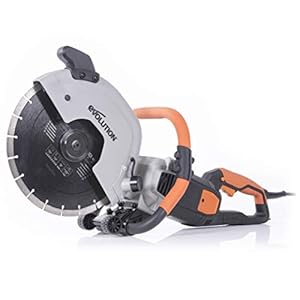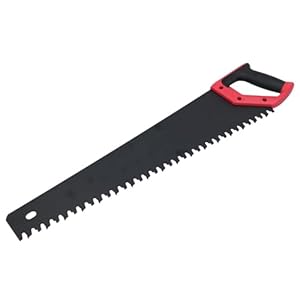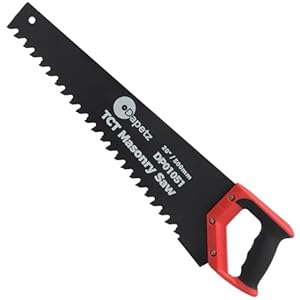The 10 Best Offers for Masonry Saws - February 2026
We already helped 10 million customers this year!
- Huge Cut Capacity - The all-new Evolution 300mm /12-inch concrete cutting saw can cut up to 115mm /4-1/2 inch deep; That’s more capacity than most leading petrol-powered saws
- High Torque Motor - Delivers consistent peak power and prevents the machine from stalling under heavy-load
- Low Maintenance vs petrol-powered saws; No pull chords, no petrol and no servicing, saves you time and money
- Large Blade Coverage and Built-in Dust Port - With rubber cap for easy vacuum attachment, and protects the user from flying debris and optimises dust suppression and collection
- Wheeled Skid Plate - Makes straight cuts at ground level effortless, and the metal skid plate protects the tool and lifts the blade off the ground so it can be put down with the blade spinning
- Electronic brake - Safety counts and that’s why all our new DCT Electric Disc Cutters feature an advanced electronic brake control for the disc
- Comes equipped with Evolution’s General Diamond blade with high diamond concentration for efficient, clean cuts - ideal for stone, reinforced concrete and bricks
- 3 Years limited warranty (only valid if purchased in the UK)
| Colour | Manufacturer | Weight |
| Orange | Evolution Power Tools | 9.7 kg |

- Efficient & Clean Cutting with Carbide Teeth Our reciprocating saw blades feature strategically spaced carbide teeth for fast, efficient cutting through masonry materials. The weight-optimised design reduces vibration and enhances control, ensuring smooth and precise cuts in brick, concrete, and cement composite panels.
- Ideal for Masonry & Demolition Applications Perfect for cutting brick, aerated concrete, lime sand bricks, cement panels, and more. These saw blades are essential for renovation tasks such as inserting doors, windows, or dismantling walls. Note: Not suitable for cutting reinforced concrete with stones.
- Universal Shank Fits Most Saws Designed with a universal shank, these carbide saw blades are compatible with most reciprocating saws, sabre saws, and tiger saws. Whether you’re using corded or cordless models, these blades deliver reliable performance without compatibility issues.
- Durable Carbide Steel Construction Built with high-quality carbide steel and tungsten carbide tips, these saw blades offer exceptional hardness, wear resistance, and longevity. The robust steel backing withstands high-intensity demolition work, making them ideal for professional and DIY use.
- Reduced Dust & Vibration for Comfortable Use The inlaid tooth structure minimises dust generation, while the balanced design reduces operator fatigue. These blades are optimised for clean, efficient cutting with less mess and more comfort—even during extended use.
| Colour | Manufacturer | Weight |
| Blue | CECOMBINE | - |

- TCT Masonry Saw: Heavy-duty blade with 25 teeth and 13 Tungsten Carbide Tips.
- Rust Resistant Coated Blade: Ensures long-lasting performance and durability.
- Ergonomic Rubber/ABS Handle: Designed for a comfortable and secure grip.
- Precision Cutting: Ideal for brick, aerated concrete blocks, slate, and cement products.
- Versatile Use: Suitable for a wide range of masonry cutting tasks.
| Colour | Manufacturer | Weight |
| Orange | Neilsen | 749 g |

- Bonded rust-resistant coating
- 17 tungsten carbide tips & 35 teeth
- Cuts brick, aerated concrete, slate & cement
| Colour | Manufacturer | Weight |
| Silver | Silverline | 850 g |

- Carbon steel alloy blade
- TPR soft grip handle with 90° and 45° angle markings
- Teflon coated blade for long service
- Hang hole on the blade for easier storage
- Draper lifetime warranty
| Colour | Manufacturer | Weight |
| Blue and Black | Draper | 790 g |

- Blade Length-500mm/20 Inch.
- 1.75mm Thick Blade.
- Comfortable Soft Grip Handle.
- Heat Treated Blade.
- Use to cut Brick, Aerated Block, Slate and Cement Products.
| Colour | Manufacturer | Weight |
| Silver | AB Tools | 749 g |

- 【Efficient and Clean Cutting】The spacing design of the carbide teeth ensures efficient and fast cutting.The weight of the reciprocating saw blades have been carefully optimised to reduce vibration during use, thus significantly increasing cutting efficiency and operating comfort
- 【Suitable for High-Intensity Work】The product is designed for high-intensity work, suitable for masonry cutting during demolition. The blade is built on a sturdy steel backing to withstand harsh demolition conditions.The adoption of inlaid saw tooth structure effectively reduces the generation of dust.
- 【Carbide Steel Material】Our reciprocating saw blade is made of high-quality carbide steel and tungsten carbide teeth, which has high hardness and enduring. it has excellent wear resistance, corrosion resistance and long-lasting durability
- 【Widely Uses】The reciprocating saw blade is suitable for common cordless saws, reciprocating saws, tiger saws. It can reduce the amount of dust generated and is weight-optimized to reduce vibration levels. The blade with good thickness and extra-large tooth spacing, fast, rough and straight to cut.
- 【Suitable for Various Materials】This reciprocating saw blade with universal shank is designed for masonry applications, which is suitable for cutting a variety of building materials including brick, porous concrete, aerated concrete, lime sand bricks, cement composite panels. It can cut wall, insert new doors and windows, and dismantle old parts. Note: This product can cut cement brick, but cannot cut concrete with stones.
| Colour | Manufacturer | Weight |
| 10in | Fyeme | - |

- CUTTING PERFORMANCE: The heavy-duty TCT masonry saw is designed for cutting brick, aerated concrete blocks, slate, and cement products with ease.
- RUST-RESISTANT COATING: Features a bonded rust-resistant coating, ensuring long life and durability in various working conditions.
- SHARP CUTTING TEETH: Equipped with 23 quality sharp cutting teeth for efficient and precise cutting performance.
- BLADE LENGTH: The saw measures 500mm (20 inches) in length, providing a suitable size for various cutting tasks.
- CARBIDE TIPS: Includes 11 tungsten carbide tips to cut through tough materials with enhanced durability.
| Colour | Manufacturer | Weight |
| Black | Dapetz | 800 g |

- 【High-Performance Cutting Power】This 10-inch concrete saw blade is designed with premium carbide steel and tungsten carbide teeth, ensuring long-lasting durability and superior cutting performance. It provides clean, precise cuts for tough materials, making it ideal for reciprocating saw blades used in masonry and demolition.
- 【Efficient, Clean Cuts with Reduced Vibration】Our reciprocating saw blades feature a weight-optimized design that minimizes vibration and dust, allowing for smoother operation and cleaner cuts. Whether you're cutting brick, cement, or concrete, this blade will keep your work area neat while providing fast, rough, and straight cuts with ease.
- 【Durable, High-Intensity Design】Built to handle demanding work environments, this saw blade reciprocating features a sturdy steel backing and carbide steel teeth, ensuring it can withstand the toughest demolition jobs. It is the ideal brick cutter for high-intensity masonry work like wall dismantling, window installation, and concrete cutting during renovations.
- 【Versatile Cutting for Various Materials】Designed for versatility, this blade can cut through brick, cement composite panels, aerated concrete, and more. Its universal shank fits most common reciprocating saws, making it perfect for a variety of building materials. Whether you're working on demolition or renovation, this blade is a must-have for cutting through tough materials.
- 【Easy-to-Use, High-Efficiency Blade】This concrete saw blade provides easy installation and is designed for efficient operation. The saw blades reciprocating are optimized for reduced dust and vibration, ensuring long-lasting performance while cutting through tough materials such as bricks, concrete, and cinder blocks.
| Colour | Manufacturer | Weight |
| Blue | Srumvoat | - |

- The Roughneck Masonry saw is tungsten carbide tipped for maximum cutting strength
- Ideal for cuts in concrete blocks, breeze blocks and bricks
- Rigid 1.5mm blade for strength and accuracy
- Soft grip handle for comfort
- 25 YEAR ROUGHNECK GUARANTEE
| Colour | Manufacturer | Weight |
| Yellow | Roughneck | 900 g |

General information about Masonry Saws:
Introduction to Masonry Saws
Masonry saws are powerful tools commonly used in construction and other related industries for cutting dense materials such as concrete, bricks, tiles, and stone. They are an essential piece of equipment for professionals who work with these materials regularly. Masonry saws offer precise and efficient cutting capabilities, allowing for accurate and clean cuts, making them highly popular among contractors and tradespeople.
Types of Masonry Saws
There are several types of masonry saws available on the market, each designed for specific applications. The most common ones include:
1. Wet Masonry Saws: These saws use water to cool down the blade and reduce dust produced during cutting. Wet masonry saws are ideal for heavy-duty cutting tasks and are often used in construction sites or large scale masonry projects.
2. Dry Masonry Saws: As the name suggests, these saws do not utilize water during the cutting process. They are smaller and more portable compared to wet saws, making them convenient for jobs in smaller spaces or for on-site repairs.
Key Features and Functions
Masonry saws are equipped with robust cutting blades that are specifically designed to withstand the rigors of cutting hard materials. The blades are typically made from diamond-embedded metal, ensuring durability and efficient cutting performance. Some saws also feature adjustable cutting heads or tables, allowing for precise angle adjustments when making bevel cuts or other complex cuts.
Another important feature of masonry saws is the dust management system. Since cutting materials such as concrete and brick can generate a significant amount of dust, masonry saws are often equipped with dust collection systems or water-based cooling mechanisms to minimize dust accumulation and maintain a clean working environment.
Safety Considerations
Using masonry saws requires proper safety precautions. Operators should wear suitable personal protective equipment (PPE) such as safety goggles, gloves, and ear protection to prevent any potential injuries. It is also crucial to follow the manufacturer's guidelines and recommendations to ensure safe and efficient operation of the saw.
In conclusion, masonry saws are indispensable tools in the construction industry, enabling precise and efficient cutting of dense materials like concrete, bricks, tiles, and stone. With various types available, including wet and dry saws, these tools cater to different needs and applications. Their robust cutting blades, adjustable features, and dust management systems make masonry saws reliable, durable, and safe to use.
** "Free Delivery" means that this is possible under the given conditions at the time of data retrieval from the relevant provider, but cannot be guaranteed. It is technically not possible to provide information in real-time. The shipping costs may vary under certain circumstances (different provider, place of delivery, etc.). The shipping costs shown in the further ordering process apply.
Other IMPORTANT INFORMATION that we ask you to take note of:
We may receive a commission if you make a purchase via the links on our site. This has no impact on the placement of the products on our site. Our website is part of amazon associates program - Amazon, Amazon Prime, the Amazon Logo and Amazon Prime Logo are registered trademarks of Amazon, Inc. or its affiliates.
Disclaimer:
1. The prices shown may have risen since the time we last updated them.
2. The actual price of the product on the seller’s site at the time of purchase will govern the sale.
3. It is not technically possible for the prices displayed above to be updated in real-time.










